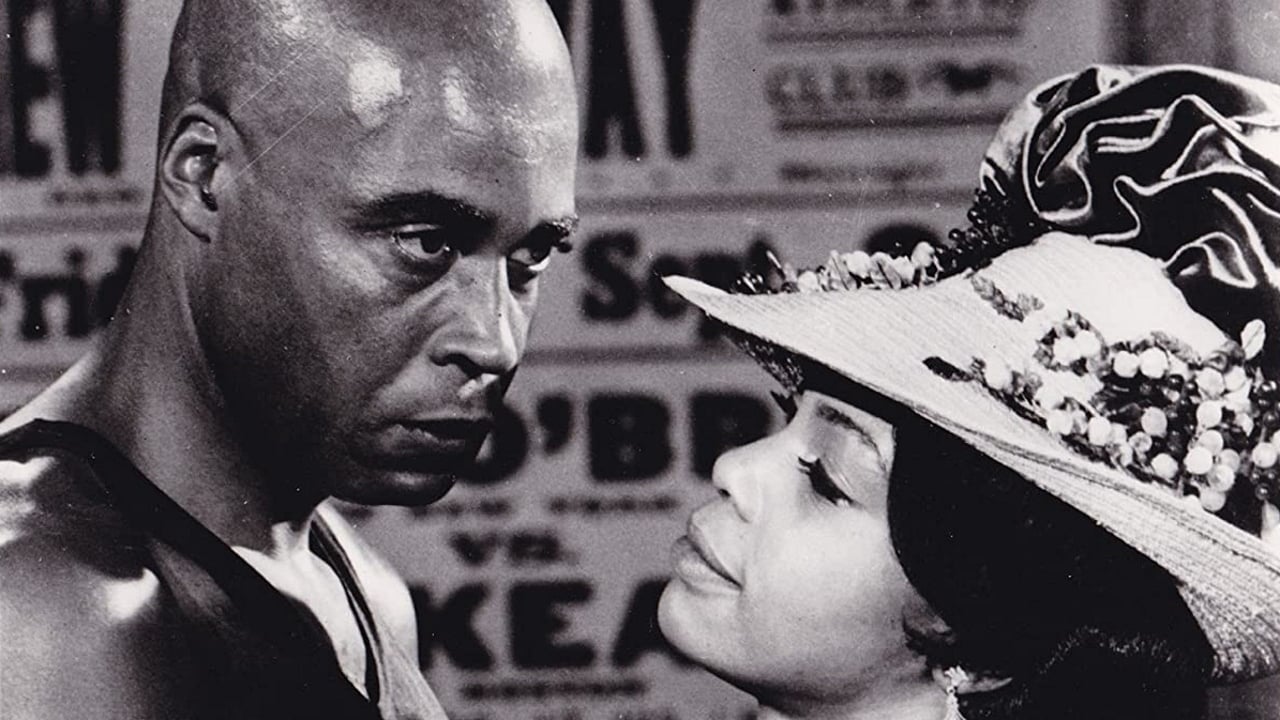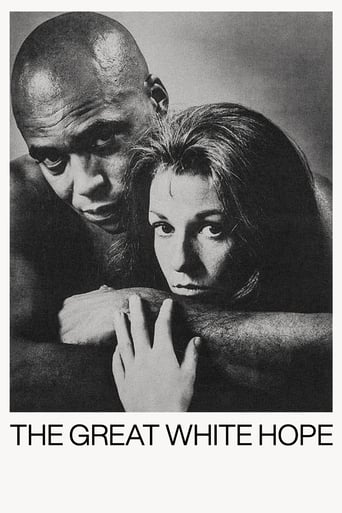



Slow pace in the most part of the movie.
One of the best films i have seen
It's fun, it's light, [but] it has a hard time when its tries to get heavy.
View MoreThe story, direction, characters, and writing/dialogue is akin to taking a tranquilizer shot to the neck, but everything else was so well done.
View MoreJames Earl Jones steps into the metaphorical Hollywood ring playing the first African-American to break the colour barrier as Jack Jefferson (based on real life boxer Jack Johnson). Not only that but he also goes on to become the first African-American to win the World Heavyweight Champion. After winning the Championship, the boxing community was deeply outraged by such events, that Jefferson becomes an instant target of racism as scouts were splurging around looking for their next "White Hope". If that isn't enough, the outrage is turned up another notch in both the white and black community as Jefferson is currently in a relationship with a Caucasian woman Eleanor Bachman (Jane Alexander). And while Jefferson keeps knocking down all these tough guys to their feet, these detractors use underhanded tactics to finally bring him down.Under the direction of Martin Ritt (who directed such classics as "Hud" and "The Spy Who Came in From the Cold"), and based on a play by Howard Sackler (who also wrote two "Jaws" scripts), the movie is one to likely hold one's interest but it doesn't measure up the long-running very successful play. The primary struggle this movie has is the standard clichéd look at the world of boxing during that time period (early 1910's) and the somewhat theatrical performance by James Earl Jones. The story feels too narrow thin and Jones' performance is way too powerful (I'll give him a break it was his first starring role), but the film is very lopsided and awkward in its delivery.With that said, Jones gives an amazing performance and the powerful bass voice he possesses will deliver the message across from here to kingdom come. Is it possible that they refrained from a cool cat like Sidney Poitier character to a more loud, eternally defensive character to add more tension for the character and the predominately bigoted Caucasian characters? It also seems interesting that even through trials and tribulations, Jefferson still has a smile on his face, even though his smile is obviously superficial. Jones was excellent in his Oscar nominated role complete as a weighs in a grimaced expression faced with an angering interior.Aside from Jones' powerful performance, Jane Alexander was wonderful as she reprises her Broadway performance as the troubled caught-in-the-middle Caucasian love-interest to Jack. We feel her pain as bi-racial relationships was not tolerated in that time period, let alone when this film was released in 1970 for that matter. but her anguish will likely melt your heartstrings in the right place. It's too bad she never rose further in the film industry as other divas in the 1960's and 1970's.The film loses its panache once Jefferson is forced to leave the United States for (Cuba?)and issues start to drag on for too long making the movie not intended for cinema. It starts to become formulaic and predictable. But in all fairness "The Great White Hope" set the bar for other boxing movies of this calibre like "The Hurricane" and "Ali". The boxing scenes feel real and authentic, but the issues on racism in movies have been going on for years that it's something I've seen thousands of times. But at the end, the powerful message left me with a lump in my throat. It was that powerful.Even though this movie was lopsided and not very setting at times, it still grabs your attention and delivers a very powerful punch. I recommend this movie mostly to the performances and the characters especially from James Earl Jones and Jane Alexander and for the supporting stars as well like Hal Holbrook, Moses Gunn, Robert Webber, Beah Richards and R.G. Armstrong. If you ever have a chance please feel free to watch this movie and feel intrigued by it.
View MoreI saw this movie in 2011. I love boxing history and I love Jack Johnson (Called Jack Jefferson in the movie) who should have a much larger name in boxing than he does. He was big and powerful. I would rank him right up there with the best heavy weights ever including Ali. Perhaps even better and certainly dealt with much much more controversy than Ali ever did.This movie may have been OK in it's time.First of all it never shows his rise to be the champ and that was perhaps a more amazing story as no white fighter would even fight him to give him a chance at the title.James Earl Jones (JEJ)does an amazing job but I don't think he was the right person. They likely just did not have enough candidates. The real Jack Johnson had a much more amiable look to him. He was someone you liked by just looking at him and a natural charm. You can not say that at all about JEJ. JEJ tries to break down his rough persona to appear more like Johnson by sudden flashes of child-like smiles and gestures, that simply were unnatural and for me did not do the job at all. His constant back and forth of his normal serious look and poorly faked charmed simply seemed to flow poorly. He was simply the wrong person and too rough to represent Jack Johnson. Of course physically Jack Johnson was much larger and more muscular than JEJ.Then the movie jumps around too fast. When Johnson was beaten in Cuba the fight also was different. It was scheduled for 45 rounds. Johnson won the early rounds but as he was much older and out of shape he eventually ran of gas. In the movie I got the feeling like he left a broken down champion that was beaten but in reality he was old and past his prime. Much like Ali was when he was beaten on his last fight.The movie also misrepresented his love affair. He had multiple white lovers over the years and one did not die by suicide as shown in the movie.I just could not figure out what the movie was trying to show at the end. He was a great champion or he was not so great?? The portrayal was not done right.If you like to really know about him correctly read on Wikipedia or watch a documentary Called 'Unforgivable Blackness' that is a master piece.BTW I am not Black or White American. No bias here. I am Persian. But I give credit to Jack Johnson who was simply one the best man I have learned about: as a boxer and as fighter of racism. He had his faults like everyone else of course.
View MoreGreat movie about racism in the world at that timeJames Earl Jones was both the film and Broadway actor. The Great White Hope Alvin Theatre, (10/3/1968 - 1/31/1970) Preview: Total Previews: 15 Opening: Oct 3, 1968 Closing: Jan 31, 1970 Total Performances: 546 Category: Play, Original, Broadway Setting: The years before and during World War I. Awards and nominationsOpening Night Production Credits Theatre Owned / Operated by Herman Bernstein Produced by Herman Levin Written by Howard Sackler; Music arranged by Charles Gross Directed by Edwin SherinOpening Night Cast James Earl Jones Jack Jefferson Jane Alexander Eleanor Bachman Thomas Anderson Negro Man G Jackson
View MoreRecently, Ken Burns wrote an editorial calling on Americans to make amends for what they as a society did to Jack Johnson. "The Great White Hope" shows what American society did to him.James Earl Jones plays Johnson, called Jack Jefferson here (the movie is fictionalized). He was everything that a black man in the early 20th century was not supposed to be: assertive, proud, and married to a white woman. His wife Eleanor (Jane Alexander) accepted him for who he was. Naturally, white people didn't like their marriage one bit; the black population believed that Johnson was "...gainin' an attraction to the white man's poon tang." Ostracized from society, Jack and Eleanor tried to live privately, but they were constantly hounded. Jack became increasingly abusive towards Eleanor, until she took her own life. Distraught, Jack went in for one last showdown in Cuba.Regardless of what you think of the movie overall, it's important because it shows a part of our history that we may never be able to get over, and in fact are still addressing today. Director Martin Ritt espouses the same kind of social awareness that he discussed in "Hud", "Sounder", "Conrack" and "The Front". A masterpiece.
View More